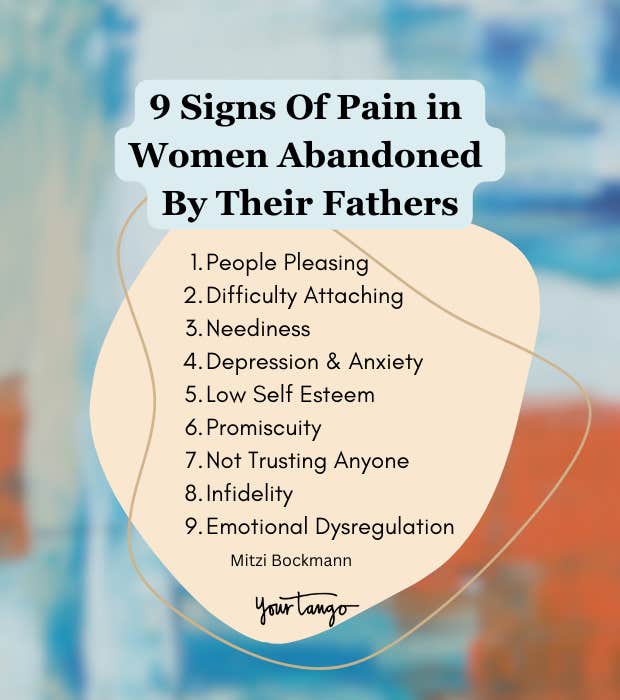9 Things Women With Father Wounds Do Without Realizing The Harm
Whatever happened wasn't your fault, but you do have the power to heal from it.
 tabitha turner | Unsplash
tabitha turner | Unsplash My father walked out on our family when I was seven. He didn’t disappear forever. He came and went, sometimes staying for a few weeks or days, and then he would leave again. It was very confusing and resulted in father wounds that I didn't realize impacted me until later in life.
For much of my life, my dad and I had been close. My mom worked days while my dad was at business school, so he was the one who took me to school, picked me up, and fed me dinner. We were very similar, and I was so lucky to have him.
As a result, his no longer being a constant presence in my life when I was seven was devastating. The feeling of being abandoned by my father changed everything for me. And it still resonates to this day.
Nine things women with father wounds may do without realizing their impact
1. They people-please
When my dad came home, I did whatever I could to make him stay. I figured if I was just nice enough, he would stay. I was sure his coming and going was because of something I was doing, so I did whatever I could to make him happy. Not surprisingly, it didn’t work. No matter how nice I was, he left again.
I found this need to please people has carried forward in my adult relationships. Whenever there is an issue, instead of speaking up about what I want and need, I try to keep quiet and be good. I try to be accommodating and not demanding, and do whatever I can to keep my person happy.
I am so scared they are going to leave me if I don’t behave well, just like my dad did, so I keep my head down and hope.
Guess what? It still doesn’t work. If I act this way, if I continue to please people, my person still leaves, just like my dad did.
The unintentional harm of people pleasing is explained by life coach Patricia Bonnard, "Despite a people pleaser's generally persistent good-natured manner, inconsistencies between their intent and delivery can ultimately wear down your trust and spoil your relationship. Pleasers don't intend harm. It's just that their stronger need to please overrides other inclinations."
2. They have difficulty attaching
 Prostock-studio via Shutterstock
Prostock-studio via Shutterstock
When my dad left, I was devastated. We had been so close, and his absence left a huge void in my life. And, no matter what I did, I couldn’t get him to stay.
As time went on, and my father continued to come and go, I found myself becoming less interested in his doings. I stopped trying to please him to get him to stay, and I started distancing myself from him. I found not engaging him when he was home made it much easier for me not to be so hurt when he left.
It was not a healthy coping mechanism, but I was young, and I didn’t know better. So that's what I did.
Unfortunately, this detachment carried into my adult life. Whenever I meet someone, I proceed very cautiously. I erect a very tall wall, and it takes someone a long time to scale it and get into my heart.
Why? Because I just don’t trust if I give this person my heart, they won’t just leave. So, I build these walls, and I don’t let anyone in.
These walls haven’t worked, however. More often than not, a man will stop trying to scale my wall and move on to someone else. If they do get over it, I still have a hard time attaching to them and something puts a wedge between us and ultimately kills the relationship.
I have this anxious attachment issue, and I am trying to fix it, but the pain of my dad leaving runs pretty deep.
"The impact of absent or abusive fathers is one of the adverse childhood experiences that has been largely ignored. For most of us, we block out early trauma. It was painful at the time, but we survive and get on with our lives, hoping to put the memories behind us. However, what we don’t remember can cause problems later in life," as described in the clinical experience of psychologist Jed Diamond.
3. They struggle with their neediness
One of the things I struggled with when I was younger was being very needy in a relationship. Not so much now that I am older and wiser, but it was an issue when I was young.
When I got into a relationship, I was incredibly needy. I wanted to spend as much time as I could with my person. I needed them to shower me with words of affirmation and physical touch. I needed to get constant reassurance that they weren’t going to leave me.
Because I was a people pleaser, I needed all of these things but didn’t know how to ask for them.
So, because I never asked, I never got what I needed, which just made me needier and needier, and that, ultimately, killed any relationship that I might be in.
4. They cycle through periods of depression and/or anxiety

I'm sure this one is not surprising. When a daughter is left behind by her father, it’s traumatic. This kind of trauma can lead to long-lasting depression and/or anxiety, as supported by a study from the University of Calgary.
The depression about the pain of the abandonment and, for me at least, because every time he comes back into my life, he leaves me again.
The anxiety because of the unknown. Hoping that this time it will be different and that my father will stay and not get let down again. I always hope that it will be different, but it never is.
This depression is with me every day, and the anxiety is the constant companion of many of my clients. I have found that medication has helped, but it’s still emotionally hard when my father comes and goes.
5. They feel stuck in low self-esteem
Think about how you feel when a partner breaks up with you or when you have been in a long-term relationship with someone who treats you with disrespect. How might that make you feel? Perhaps like you are a loser?
I know that many women blame themselves when their father, who is one of the first and most important relationships for a girl to have, leaves. They truly believe that if only they are good enough, someone won’t leave and that they are losers and unloveable.
How can a girl whose father left her not feel that way? After all, he is her father. Isn’t he supposed to love her, no matter what?
6. They feel disconnected from their intimate choices
For many women whose fathers have left them, they are prone to promiscuity.
I can’t tell you how many of my friends and clients believe if they are physically intimate with someone, they will get the love and commitment they want. Unfortunately, being quickly intimate with someone is not part of the recipe for building a happy relationship, and so their endeavors fail.
They try again. And again. And again. Hoping against hope, if they give their person what they want, then they will stay. After all, when a woman is physically intimate with someone, she feels closer to them afterward. Why can’t a man feel that way about her if she is intimate with him right away?
More often than not, after men get the intimacy they want, they disappear, leaving a woman to look for another man to try to get to love her.
7. They have trouble trusting people
 Chainarong06 via Shutterstock
Chainarong06 via Shutterstock
Does this one sound familiar if your father abandoned you when you were a child?
I am guessing it does. Again, the father is a very important person in a woman’s life, and if they can’t trust their father to take care of their heart, who can they trust?
As a result, women who have been abandoned have a difficult time trusting any man who might come into their lives.
They believe that their person might leave them, fool around with them, or talk about them behind their back. They don’t believe it when their person tells them they love them or that they won’t ever leave.
Unfortunately, this lack of trust in a relationship will ultimately kill it. Trust is the key to any healthy relationship, and a woman whose father has abandoned her will most likely have a really hard time believing that their person won't, too!
8. They struggle with being faithful
Many of my clients are sure that their partners will leave them, as their fathers did. And what do they do? They try to leave their partner before they are left.
Unfortunately, it is hard for abandoned women to walk away from their men for good, so instead, they cheat on them. They give themselves to another person, emotionally and physically, so they can become detached from the person they love. So if the person they love leaves them, they believe they will be OK.
This doesn’t usually work, sadly. Cheating on their person only makes someone feel worse about themselves, reinforcing the feelings of low self-esteem that are the result of their abandonment. And, when their partner finds out about the affair and leaves them, this just reinforces the belief that men leave. Always.
Cheating becomes a self-sabotaging behavior as psychologist Perrin Elisha explored, "Anxiously attached people tend to jump into a relationship. [They] might attach to someone who they later find out is either not right or isn’t or wasn’t in the relationship for the right reasons. When an anxiously attached individual finds themselves attached to the wrong person, a painful battle ensues that tends to be fraught with confusion, self-doubt, and pendulum swings in and out of a relationship or in and out of bad feeling states."
9. Emotional dysregulation plagues them
For many women who were abandoned as a child, they have a hard time controlling their emotions.
Perhaps they have intense mood swings, going from highs to lows very quickly. Perhaps whatever feeling they are feeling, whether good or bad, they feel it very fully, often to a destructive extreme. Perhaps they get depressed or anxious, and they can’t control it. Perhaps they are very impulsive and/or very controlling in their lives.
However it presents itself, emotional dysregulation is often the result of a woman being abandoned by her father. The trauma of being left is more than a child’s brain can handle, and, as a result, it can misfunction, as shown by research on childhood trauma, emotional dysregulation, and associated effects published in Harvard Review of Psychiatry.
Luckily, emotional dysregulation is something that can be dealt with with counseling, medication, and self-care. If you find yourself with emotions that you can’t control, seek help right away.
I wish when a child is born, parents are given a manual about how to be a good parent. Unfortunately, this doesn’t happen, and new parents are left to raise a child without a full understanding of what they are doing. They make mistakes big and small.
Mothers are genetically programmed to stay and take care of their young, fathers not so much. Sometimes, they leave, not understanding the impact that doing so can have on their daughter. It's an impact that can last a lifetime.
It’s important for all women who have had a father disappear to understand the pain we feel is real and we are not alone. Many of us have the same signs of pain in common, and many of those are the reasons we struggle to have a healthy relationship.
I am here to tell you that your father leaving doesn’t have to mean the end of your life or doom you to not having a healthy relationship. I encourage you to reach out to your doctor to talk about what you are dealing with so they can get you on the path to getting the help that you need to heal.
I did, many years ago, and I can now manage those feelings that held me back for so long. I am in a healthy relationship, one that I know will last forever!
You can do it too!
Mitzi Bockmann is an NYC-based Certified Life Coach and mental health advocate who works exclusively with women to help them be all they want to be. Mitzi's bylines have appeared in The Good Men Project, MSN, Prevention, Huffington Post, and Psych Central, among many others.
